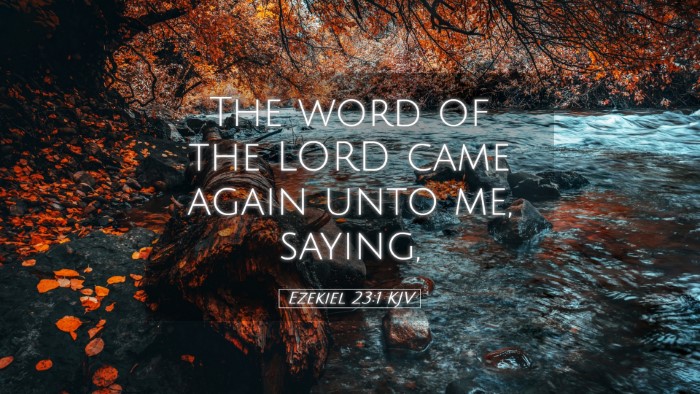Ezekiel 23:1 Commentary
In Ezekiel 23:1, the prophet Ezekiel conveys a powerful message regarding the two sister cities, Samaria and Jerusalem, symbolizing the kingdoms of Israel and Judah. The verse states:
"The word of the LORD came again unto me, saying,"
Context and Background
Understanding the historical and cultural backdrop of this verse is crucial for a comprehensive interpretation. Ezekiel prophesied during a time of great turmoil for the Israelites, particularly during the Babylonian exile. This period marked a significant shift in their religious and national identity, as they grappled with the consequences of their disobedience to God.
The Dual Metaphor of Two Sisters
The metaphor of the two sisters, Oholah and Oholibah, introduced in subsequent verses (Ezekiel 23:4), is central to understanding the message conveyed in this chapter. Each sister represents a city and its corresponding kingdom:
- Oholah: Represents Samaria, the capital of the Northern Kingdom of Israel.
- Oholibah: Represents Jerusalem, the capital of the Southern Kingdom of Judah.
Commentary Insights
The following insights from public domain commentaries highlight the theological implications and profound lessons within this verse.
Matthew Henry's Commentary
Matthew Henry emphasizes the seriousness of the charges against Israel. He notes that this passage signifies not just a historical account but a reflection of spiritual infidelity. Henry explains, "God’s people are often represented under the notion of a woman or wife, for they have made a covenant with him; their sins are often compared to adultery." This metaphor highlights the gravity of turning away from God to pursue idolatry and immoral practices.
Albert Barnes' Notes
Albert Barnes further elaborates on the significance of God's word coming to Ezekiel again, underlining the persistent nature of God’s communication to humanity. Barnes states, "The repetition of the call emphasizes its importance and the certainty of what is to follow." It serves as a reminder that God’s messages are not mere suggestions but imperative calls to repentance and accountability.
Adam Clarke’s Commentary
Adam Clarke provides a broader interpretation, focusing on the implications of the two sisters as representations of nations that have turned away from divine principles. He notes that "these two sisters engaged in acts that would lead to their destruction." Clarke highlights that the sins committed by these nations serve as a warning to contemporary societies about the consequences of spiritual and moral decay.
Theological Implications
Analyzing Ezekiel 23:1 presents several theological implications:
- Divine Judgment: The passage underscores God's role as a judge. His warnings through Ezekiel are expressions of love aiming to bring correction and restoration.
- Identity and Covenant: The metaphor indicates the relationship between God and His people; they are bound by covenant and are expected to remain faithful.
- Moral Accountability: The imagery of infidelity conveys the deep spiritual truth that turning away from God invites severe consequences, both individually and communally.
Lessons for Contemporary Readers
For pastors, scholars, and believers today, Ezekiel 23:1 serves as a poignant reminder of the following lessons:
- Awareness of Spiritual Fidelity: Christians today should remain vigilant against the temptations that distract from faithfulness to God.
- The Importance of Prophecy: Prophetic voices serve as vital instruments for calling communities back to God, underscoring the need for contemporary prophetic ministry.
- Historical Reflection: The passage encourages reflection on the historical faithfulness of communities and their present allegiance to God’s ways.
Conclusion
In conclusion, Ezekiel 23:1, while seemingly straightforward, opens up a rich tapestry of interpretation and application. The interplay of history, metaphor, and prophecy invites readers into a deeper understanding of their relationship with God and the spiritual responsibilities that accompany it. The prophetic word is not just a historical artifact; it is a living call to holiness, faithfulness, and active engagement with the divine narrative that continues to unfold in the lives of believers today.


